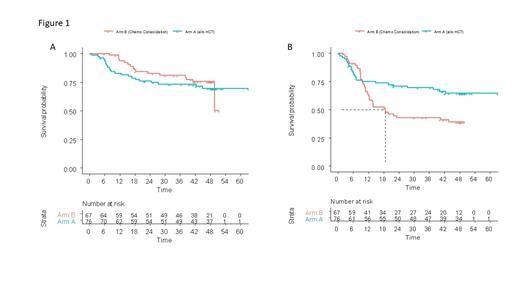Abstract
Allogeneic hematopoietic cell transplantation (HCT) offers the highest chance for cure in patients with adverse-risk acute myeloid leukemia (AML) when performed in first remission (CR1). In contrast, patients in CR1 with favorable risk do not seem to benefit from allogeneic HCT due to the inherent risk of transplant-related mortality. Donor vs. no donor comparisons as well as prospective matched-pair analyses have suggested that allogeneic HCT performed in intermediate-risk AML may provide a higher probability of overall survival or relapse-free survival in patients ≤ 60 years of age with an acceptable risk for transplant-related mortality. On the other hand, many intermediate-risk patients relapsing after conventional chemotherapy may be successfully salvaged by allogeneic HCT.
The role of allogeneic HCT in cytogenetically defined intermediate-risk AML patients in CR1 was addressed by a prospective randomized trial performed in 16 centers in Germany. Key inclusion criteria were: AML with intermediate-risk cytogenetics, first CR or CRi after conventional induction therapy, age of 18-60 years, and availability of an HLA-matched sibling or unrelated donor. For unrelated donors, a 9 out of 10 HLA allelic match was acceptable except for patients with an NPM1 mutation, for whom full 10/10 allele matching was required. Randomization was stratified according to age (< 40 vs. 40-60), NPM1/FLT3, and CEBP-alpha mutational status and unrelated vs. related donor availability. Endpoints included overall-survival as primary outcome and relapse-free survival (RFS), cumulative incidence of relapse, treatment-related mortality, and quality of life measured according to the short form (36) health status.
From 2010 - 2018, 143 patients in CR1 were randomized into Arm A (n=76, allogeneic HCT) and Arm B (n=67, conventional consolidation and allo-HCT only in case of relapse). In July 2018, the trial was stopped prematurely due to slow accrual (143 out of 356 pts. randomized). Median age of the trial cohort was 51 years (range, 19-60), with 42% exhibiting an NPM1 and 25% a FLT3 mutation. A normal karyotype was reported in 84% of the included patients. All mentioned characteristics did not differ between both treatment arms. Sibling donors were available for 44 (31% of patients), matched unrelated donors for 99 (69%) patients.
According to the intent-to-treat analysis, the probability of survival at 2 years was 71% (95% CI 60-81%) and 84% (95% CI 73-92%) in Arm A (Transplant) and Arm B (conventional consolidation), respectively (p=0.120, Figure 1A). RFS after allogeneic HCT was 69% (95% CI 57-80%) compared to 41% (95% CI 29-54%) after conventional consolidation (p=0.001, Figure 1B). Primary allogeneic HCT reduced the cumulative incidence of relapse at 2 years from 57% [95%-CI 46-71%] after conventional consolidation to 20% [95%-CI 13-31%] after HCT (p<0.001). Non-relapse mortality at 2 years after primary allogeneic HCT was 9% [95%-CI 5-19%] compared to 2% [95%-CI 0-11%] after consolidation (p=0.017).Most importantly, all 38 patients relapsing in arm B (33 hematologic, 4 molecular and 1 extramedullary) proceeded to allogeneic HCT as salvage therapy. Multivariable Cox regression analysis revealed a status of CRi compared to CR before randomization to be associated with a significantly higher risk of death (HR 3.3, p=0.009).
SF (36) scoring suggested a trend towards a lower physical functioning throughout the first 3 months after randomization in the primary HCT arm. No significant differences in vitality, mental health, social and emotional functioning could be documented between both treatment arms.
In summary, the results of this first prospective randomized trial did not show that allogeneic HCT performed immediately after achievement of CR1 in patients with cytogenetically defined intermediate-risk AML ≤ 60 years of age conveys an overall survival advantage. However, allogeneic HCT in CR1 significantly reduced the relapse risk and was not associated with relevant impairments in quality of life. Although the limited statistical power of the trial does not allow definitive conclusions, delayed allogeneic transplantation seems to be a potential treatment algorithm in CR1 intermediate-risk AML with an available donor.
Schliemann: Jazz Pharmaceuticals: Consultancy, Research Funding; Roche: Consultancy; Philogen S.p.A.: Consultancy, Honoraria, Research Funding; Pfizer: Consultancy; AstraZeneca: Consultancy; Boehringer-Ingelheim: Research Funding; Novartis: Consultancy; Abbvie: Consultancy, Other: travel grants; Astellas: Consultancy; BMS: Consultancy, Other: travel grants. Schetelig: Roche: Honoraria, Other: lecture fees; Novartis: Honoraria, Other: lecture fees; BMS: Honoraria, Other: lecture fees; Abbvie: Honoraria, Other: lecture fees; AstraZeneca: Honoraria, Other: lecture fees; Gilead: Honoraria, Other: lecture fees; Janssen: Honoraria, Other: lecture fees . Glass: Riemser: Research Funding; Roche: Consultancy, Research Funding, Speakers Bureau; Kite: Consultancy; BMS: Consultancy; Novartis: Consultancy; Helios Klinik Berlin-Buch: Current Employment. Platzbecker: Janssen: Honoraria; Celgene/BMS: Honoraria; Novartis: Honoraria; Takeda: Honoraria; Geron: Honoraria; AbbVie: Honoraria. Burchert: Novartis: Honoraria, Research Funding; AOP Orphan: Honoraria, Research Funding; Pfizer: Honoraria; Incyte: Honoraria; Gilead: Honoraria; BMS: Honoraria. Haenel: Jazz: Consultancy, Honoraria; GSK: Consultancy; Bayer Vital: Honoraria; Takeda: Consultancy, Honoraria; Roche: Consultancy, Honoraria; Novartis: Consultancy, Honoraria; Amgen: Consultancy; Celgene: Consultancy, Honoraria. Mueller: Amgen: Membership on an entity's Board of Directors or advisory committees, Research Funding; Celgene: Membership on an entity's Board of Directors or advisory committees, Other: Travel Support; CTI: Membership on an entity's Board of Directors or advisory committees; Gentium: Other: Travel Support; Gilead: Other: Travel Support; Janssen: Other: Travel Support; Novartis: Other: Travel Support; Pfizer: Other: Travel Support; Sanofi: Other: Travel Support. Berdel: Philogen S.p.A.: Consultancy, Current equity holder in publicly-traded company, Honoraria, Membership on an entity's Board of Directors or advisory committees. Stelljes: Novartis: Consultancy, Speakers Bureau; MSD: Consultancy, Speakers Bureau; Pfizer: Consultancy, Research Funding, Speakers Bureau; Kite/Gilead: Consultancy, Speakers Bureau; Celgene/BMS: Consultancy, Speakers Bureau; Medac: Speakers Bureau; Amgen: Consultancy, Speakers Bureau.


This feature is available to Subscribers Only
Sign In or Create an Account Close Modal